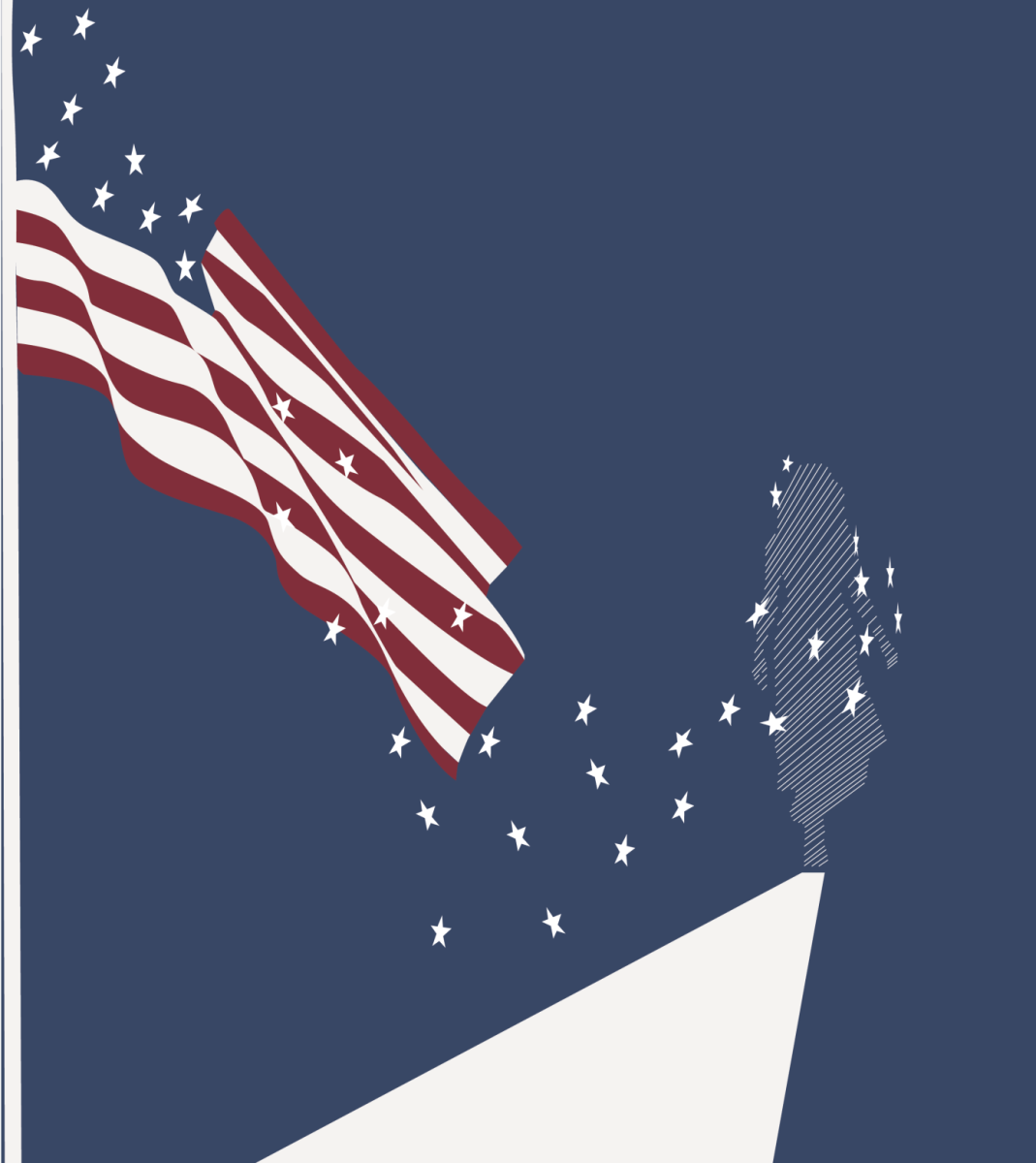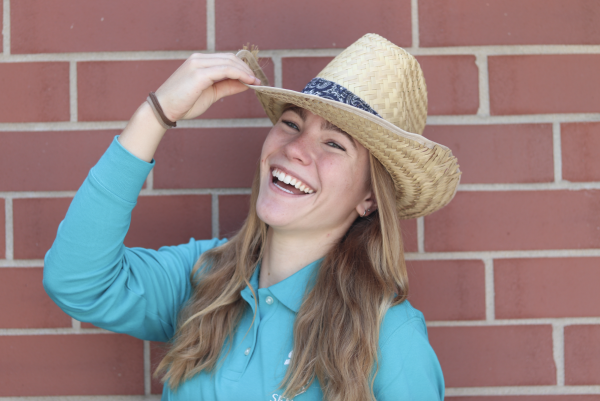Campaign signs line yards as you drive home from school, littering the green with slogans. At home, Fox News blares from your TV on one channel as CNN berates conservative ideologies on another. The first presidential debate in June ended in one candidate dropping out, the second in September mostly remembered for TikTok memes and SNL skits. As we watched Harris and Trump hurl insults at each other across a distance much larger than just the 12 feet between them, we sat bewildered, at a loss for words.
How have we come to this point?
It’s shocking to see the civil discourse that was once the bare minimum of expectations and respect for not only presidential candidates, but for any elected officials. In older eras, even candidates with completely opposing perspectives maintained a certain level of decorum both on and off the podium. As we flash forward to the 2016, 2020 and 2024 elections, the handshakes and nods of respect have been replaced with cruel jabs, personal attacks and misinformation. Once, as election season approached, arguments might have been heated and difficult, but wouldn’t have resulted in the destruction of relationships. Now, the lack of civility branches far beyond the debate stage, breaking connections and creating ignorant citizens, too often blinded by their own perspectives.
“Politics has just become who can slander each other the loudest,” junior Brooke Stewart said. “It’s gone from being concerned about the good of the country to ‘us vs. them.’ It’s more about why you shouldn’t vote for that person than why you should vote for this one.”
In our heated two party system, we often forget that opposing candidates or perspectives were meant to be just that; Opponents. Someone who you’re in competition or disagree with, but still deserves the same dignity as you would give to your friends and family. In the end, it’s vital to remember that our opponents are human, and deserving of respect no matter their policies or beliefs.
An enemy is someone who you intend to take down, who is to be defeated at all costs, in any manner. Viewing the opposing side as the enemy alienates them as people. They become less human and the idea of collaboration becomes preposterous. This dangerous belief makes it difficult for people to empathize with one another. It’s easier to justify attacking someone else when generalizing them into one group or idea.
“You should be debating the issues and not the person,” theater tech teacher Maggie Killian said. “I feel like we’ve really gotten away from that as a society. While we feel really divided right now, I hope people will realize that’s not sustainable and come back together.”
Crumbling From Within
A sequence of unexpected events unfolding during the 2024 election season – from President Joe Biden dropping out in mid-July to the two assassination attempts on former president Donald Trump – has drastically increased tensions between the Democratic and Republican parties. As hatred for the opposing side increases dramatically, so too do loyalties to political candidates or parties.
“People have made those political parties their entire identity and that’s what makes this dangerous,” Stewart said. “To a degree we should be involved in politics, but not to the point where it dictates our lives and everything we do.”
According to Pew Research Center, roughly 63% of Republicans and 50% of Democrats say the majority of their friends share their political values. When constantly surrounded by our own perspectives, we become uncomfortable with listening to differing ones, therefore building a higher wall between all American citizens as a whole.
How many of your friends share your values? Your political perspectives? Your party? Are you quick to distance yourself from someone with opposing belief systems? In a generation where every image on your screen is catered to your own beliefs, it can be easy to forget the variety in the world around you. If we as a culture don’t work to repair this flawed mindset now, we will only become ignorant and narrow-sighted in the future when our voices are amplified and our votes counted.
“In AP U.S. History, we talked about Washington’s Farewell Address,” Stewart said. “He warned against a two party political system. And we know that ‘a house divided against itself may not stand.’ That’s America right now. We’re collapsing because nobody can agree on anything.”
Americans harbor a perceived threat that the opposing party is an imminent danger to the U.S. and that people who support that party or candidate must be crazy, stupid or both. Although there have always been disagreements between political perspectives, this unfiltered hatred towards one another has not always been present.
In the 1960’s, a survey was conducted by Stanford University that asked parents if they would be displeased if their child married someone of the opposite political party. Only 4% of Democrats and 5% of Republicans said they would be displeased. In 2010, the same question was posed and 33% of Democratic parents and 49% of Republican parents said they would be somewhat or very displeased.
“People are deemed so bad on one side or the other,” junior Summer Bannigan said. “I don’t think having a different political opinion from me is bad. I think it’s just how different people think. I feel like even if you have different political opinions on something, you can still be friends. That shouldn’t stop you from having those conversations or listening to another person.”
In the past decade, tensions between the political parties have reached a breaking point. Neither side is willing to cooperate with the other. Over the past 30 years, bipartisanship has decreased by 30% in both the House and Senate, according to Quorum. In 1989, around 35% of bills passed had bipartisan support, but this number has since decreased to 21%. As students, now is the time to ask ourselves how we can go into adulthood with a mindset focused on bettering our nation’s unity. American Public Square, a non-profit Kansas City organization that aims to “mitigate the chasm between both extremes” heavily encourages high schoolers to learn how to respectfully participate in our political climate, offering discussion and speaker based events to facilitate civil discourse.
“Why? Why are we so polarized? Why are we so hateful?” American Public Square community development director Alana Muller said. “It’s because right now, for whatever reason, at this time in our history, in this time in society, we are more individualistically focused, as opposed to community focused.”
No Other Options
Nowadays many voters lean to straight ticket voting, placing all of their votes with their preferred political party. Other voters feel pressured to vote with the mindset that choosing a third party candidate is possibly throwing their vote away. When it comes time to cast a ballot, the decision can often be reduced to red versus blue, rather than evaluating candidates based on their plans and policies. However, with this mindset, it’s impossible to ever break free from the intense division that has infected our culture.
“People may feel inclined to vote for a third party candidate, but they don’t feel like those candidates have a chance to win,” Killian said. “So they feel like they have to pick a side.”
As a divide with no in-between continues, citizens on either extreme have become volatile and political sectarianism has become a threat to society. This deep hatred towards an opposing party, and many times blind loyalty to the other, pulls the country apart. Due to our two party system, extremes are inevitable, but this isn’t how it has to be. Through a multi-party system or the implementation of rank choice voting, the current divisiveness could be quelled.
Rank choice voting allows voters to select their top candidate, as well as their second and third choices. This means that candidates from smaller parties such as the Green Party or the Libertarian Party have a stronger chance in the polls. If the first candidate you select on your ballot looks like they don’t have a chance, your vote is automatically cast for your second choice candidate and so on. This process could potentially take away some of the sharp divides between parties and force voters to consider all their options for president, not just the Democrat and Republican. People need to feel like they have an option outside of just those two main political parties and truly evaluate their own beliefs and ideologies to determine who they want to cast their vote for. So many times, due to the political climate of today, we see voters’ only reason for choosing a candidate is to vote against the other party. Rank choice voting would give voters more options of candidates who may be preferable to them, no matter their political affiliation.
“Leaning completely into a party’s values rather than yourself, I feel like you start to lose yourself,” senior Maeve Glennon said. “You lose your beliefs. You lose what you value. It’s almost as if there are these ‘cults,’ almost more of a fan club. People don’t see beyond what they’re being told, or they don’t listen beyond that. You have these leaders and you follow everything they say and then maybe you don’t see the full truth or facts. This is becoming super harmful to people.”
Do people disagree based on their political affiliations or their ideological beliefs? Data was collected by Carnegie Endowment for International Peace to determine division based on ideology. The results found both parties held many overlapping beliefs. For example, a majority of Democrats and 40% of Republicans reported that they agreed with creating a federal database to track firearm sales and banning assault-style weapons. This along with other statistics regarding racial, social and immigration issues have a substantial amount of overlapping beliefs from both sides. So why does it still seem absurd to agree with your “opposing” political party in any aspect?
“Being loyal to what you believe and your values is important,” Glennon said. “I’ve seen a lot on the news in the past of Democrats who have gone over to the Republican side and Republicans who have gone over to the Democrat side over the years. I think it’s neat that some people can recognize that. That they feel like their identity with one party is shifting to another because they’re values are staying the same and they can understand that.”
Building a unified community back together is a necessary task for our generation. This current state of our country, where a deep dislike or hatred for an opposing party is almost expected, is not sustainable.
“It’s they and we.‘If you don’t agree with me, I hate you,’ right?” Muller said. “It’s gotten so ugly. But to me, what this is really about is community. It’s how do you build relationships to create community? As human beings, we have this deep need for connection, whether we’re introverts or extroverts. I don’t think it matters. I think we have a need to connect with people, and the way we do that is we establish community everywhere we go.”
A House United
In his Farewell Address, George Washington wrote that political parties “serve always to distract the public councils and enfeeble the public administration. [They] agitate the community with ill founded jealousies and false alarms, kindle the animosity of one part against another, foment riot and insurrection.”
Is that not what our country has become? Quick hatred for one another, ears muffled by ignorance, eyes locked in a single direction? As this election season passes and we enter into the next four years with a new president at the helm, we must keep Washington’s concerns at the forefront of our minds. Somewhere along the way, our democracy has forgotten the truth. Our opponents are not also our enemies. They simply care deeply about protecting something different than the other. It’s critical that we remember this again. The threat to our democracy isn’t just the red or the blue; it’s the inability to listen and this constant polarization that prevents us from unifying towards progress.
“There’s this quote that says something along the lines of ‘the people around you may not look like you; they may not sound like you; they may not have the same clothes or money, but this is their country too,’” Muller said. “We have an obligation to embrace differences and different perspectives. We’re not doing that right now. And wouldn’t it be nice if we could get back to that.”
This isn’t an easy task. It requires critical thinking of not only your sources and those around you, but yourself. Learn about the government before criticizing it. Understand the other political party before reproaching it. Empathize with those you disagree with before mocking their values and continue to keep yourself informed.
“Read or listen to a lot of different sources,” Muller said. “Whether it’s podcasts or YouTube videos or actually reading newspapers. Get that [information] from multiple sources to understand what the various issues are. It’s time consuming, but if we’re going to be an informed citizenry, it’s really important to have more than one perspective. Don’t just listen to Fox News or MSNBC, but if you have to listen to one, listen to the other one also, or find a more neutral source for your information.”
We must build our country back up, united. We must work to bridge the divide severing the threads of unity those who built this country hoped for. As young women, we must begin to engage in conversation with the past, ourselves and the present, using our ears before our mouths, our empathy before our pride. If we can not, our own voices will ruin us as we fight bitterly amongst ourselves, letting our once unified country crumble around us.
“I hope we start talking again,” Muller said. “We start caring about each other again as humans in a way that says ‘this is your country, this is my country; we can have different perspectives but isn’t it a gift that we both get to be here and it belongs to both of us.’”





